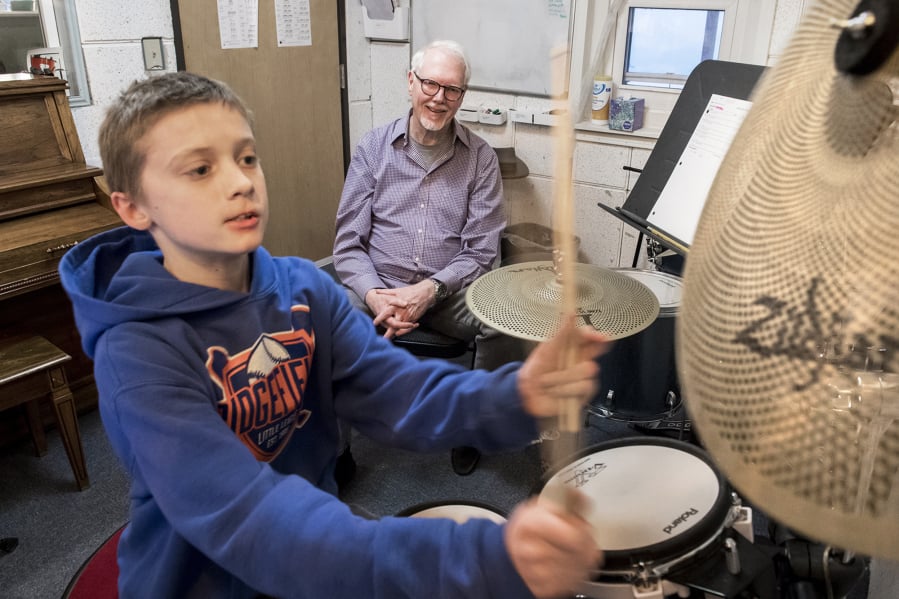Aspiring musicians who saw the Academy Award-winning 2014 film “Whiplash” might have been frightened by conductor Terence Fletcher’s ruthless approach to drum instruction.
Teaching at a fictional elite music school, Fletcher, portrayed by J.K. Simmons, is abusive in his tactics to get the best he can get out of his students.
Jim Pitts, the real-life drum instructor at Opus School of Music, takes a different path to teach the 20 students who come to him for lessons.
He’s kind, supportive, energetic and funny.
“There’s our firecracker,” said Opus school owner Rob Melton, 48, when Pitts arrived on a recent Tuesday afternoon.
The Opus School of Music
Locations: 414 Pioneer St., Ridgefield; 726 N.E. Second Ave., Camas
Employees: 16 instructors between both locations teaching about 175 students
Revenue: Undisclosed
Salary for instructors: Instructors at Opus receive a percentage of profits from lessons. Lessons cost $132 monthly for half-hour sessions or $33 per lesson; 45-minute and one-hour lessons cost more
Online: opusschoolofmusic.com
Pitts, 67, sometimes does stand-up comedy. He writes poetry. And he’ll even hug back a student who gives them — such as Javan “Tiki” Khabra, 9, a student at Chinook Elementary School whose parents decided to enroll him in lessons to help with his concentration.
The two worked together in the small lesson room No. 1, called the Van Geem Room, after a former student. Khabra worked slowly to correctly drum a beat from a page of sheet music he kept in a binder with a Labrador puppy on the cover.
“He’s been taking lessons from me for about a year. He was slow at first in terms of getting this, but he’s kind of past that point. This is not at all atypical — he’s passed that point where he has to think about what he has to do next,” Pitts said.
Khabra’s grandfather, Raghbir, waited outside the room while he practiced.
“They usually say when a kid does not concentrate and doesn’t coordinate, it’s better to teach him drums, because it’s feet and hands together,” Raghbir said, adding that his grandson has improved tremendously since starting the drums.
“Yes! That was it, do that again!” exclaimed Pitts when Khabra produced a successful sound. “Even though you struggle to play it, do you know what you’re supposed to do?”
Khabra nodded yes, while Pitts urged that he practice at home while they move on in the session.
The early days
Pitts grew up about 1,000 miles south of Clark County in Los Angeles County, Calif., a place considered decadent in the eyes of an aspiring musician back in the 1950s and ’60s.
There were lots of working musicians in the region, Pitts said. Nationally, Elvis Presley was rising to fame.
“I was in a house full of teenagers and popular music was really becoming a phenomenon at the time,” he said.
When he was 6, someone who played drums visited their family church. It was the first time he had been exposed to a proper drum kit.
“I immediately fell in love,” Pitts said. “That’s when I was hooked.”
He bought some used snare drums and a stand from local pawn shops, rigging together his own setup, at least until one Christmas when his parents bought a starter drum kit from a Sears catalog.
He played at the “local teen clubs” where he was paid about $10 a pop, eventually saving enough to buy a professional kit when he was 17 — the German-made Trixon, a brand popular in the ’50s and ’60s.
Then, he sought the most crucial part of the formula in becoming a successful musician: a mentor. Pitts would frequent a percussion shop on Vine Street in Hollywood owned by Jake Hanna, a jazz drummer who performed in the band on the “Merv Griffin Show,” a popular talk show that aired on NBC in the ’60s.
One day, Pitts recalled, he was in the drum shop and there stood Shelly Manne, a jazz drummer known for his hand in giving fire to the West Coast jazz movement. Hanna introduced Pitts to Manne, who owned a bar and restaurant called Shelly’s Manne-Hole on Hollywood Boulevard.
“I bumped into Shelly a couple more times, and I asked to study with him. He didn’t teach. He kept politely blowing me off, saying ‘I don’t have time. I’ve got gigs. I’m running a restaurant,’ ” Pitts said. “But I did it enough that he finally said, ‘Come to Shelly’s Manne-Hole tomorrow at 4 o’clock.’ ”
Pitts got to study one-on-one with Manne “three or four times,” where he learned how to work with brushes, and most importantly, the proper drumstick grip. Initially using what’s called a matchstick grip, in which the drummer is holding each stick the same way, Manne taught Pitts to use the traditional grip, in which one hand is holding the stick and facing upward, while the other holds the stick facing downward. The traditional grip is preferred among jazz drummers.
“If you’re ever going to play jazz, there’s something about that grip that really helps your feel. To this day, I don’t know if that’s true, but I’m stuck playing that way now because it’s so ingrained in me that it feels odd when I go back,” Pitts said.
Later on, in his quest to better support his family, he left depending on music gigs for money and took a sales job with Sony in the Silicon Valley area. The job eventually transferred him to the Portland area, where he worked until he retired in 2003.
In his retirement — not particularly keen on fishing — he still wanted to play music. He ended up at Opus when Melton found Pitts’ ad for lessons on Craigslist.
Pitch perfect
After Khabra was finished and embraced Pitts at the end of his half-hour session, in walked Dillon “D.J.” Trussler, 12.
The two got right into playing. Trussler, a fan of Metallica, put on the song “The Shortest Straw,” and drummed along seemingly effortlessly.
Trussler is “very high-functioning autistic,” said his mother, Tracy. He has been taking lessons at Opus for four years, and at the urging of Pitts, D.J. will soon be trying other instruments. D.J. is pitch perfect — a rare skill that is demonstrated when someone plays a note and a pitch-perfect person can immediately identify or recreate exactly what it is. That can’t be taught, Pitts said, and drummers don’t use pitch.
“So there are a number of things about D.J. and his abilities and his talent that I’ve been trying for a couple of years to spread out to a melodic instrument,” Pitts said. “He defines himself as a drummer, and I’ve been trying to get him to define himself as a musician.”
D.J. will be moving onto guitar lessons next month.
“I’m thrilled for him. I’m sad that I’ll be losing him as a student because I love him and he’s awesome and he’s inspiring to me,” Pitts said. “But I’m thrilled he’s finally moving on to where he needs to.”




